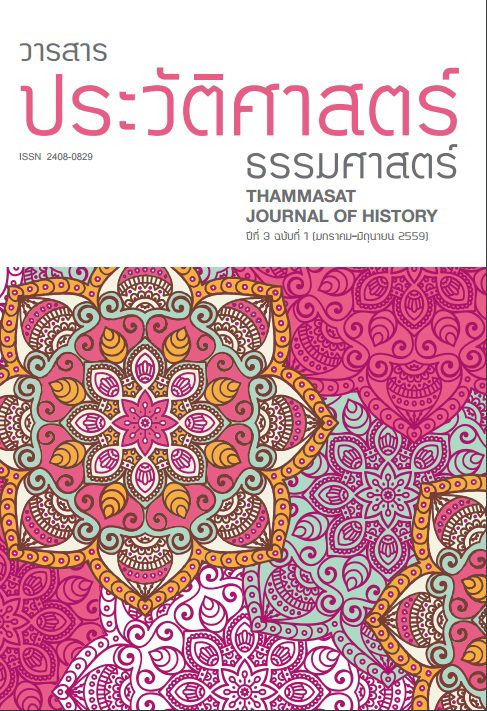The Problem of Writing Indian Historiography: Ambedkar Studies, Dalit History and Subaltern Studies; an Alternative of Indian Historiography
Main Article Content
Abstract
According to Ranajit Guha, the term “Subaltern” was used to describe Indian society from the perspective of “low class” people, whose identity contributes to a significant difference in Indian historiography. Guha and his colleagues argued that the definition of “Subaltern” should include class, caste, race, language and gender as major determining factors. However, previous scholarship on Subaltern Studies did not pay enough attention to Ambedkar and the Dalits who are indispensable as subjects of Subaltern studies. As a result, this may cause Subaltern studies to be vulnerable to a significant extent.
Still, Ambedkar Studies and Dalit History are crucial to Indian historiography, because both can shed light on subaltern people who are marginalized in India. Born in Dalit family, Dr. Ambedkar wanted to terminate the caste system. His ideology can be seen in his role as a leader in the Dalit Movement in the twentieth century. In fact, he supported the Dalit politically, economically, socially and culturally. For instance, he established People Education Society (PES), an organization to support education for the Dalits. Moreover, he was also a major influence in the drafting of the Constitution of India, which granted rights to subaltern people, the Dalits. It is therefore necessary to situate Ambedkar Studies and Dalit History in Indian historiography.
This article proposes that Ambedkar studies and Dalit history are important to the better understanding of Indian society as well as Subaltern Studies.
Article Details
Copyright of any paper published in this journal belongs to the Author and All rights reserved.
The opinions expressed in the journal are those of the authors. Department of History, Philosophy and English Literature’s Journal Committee, Editorial Board and Peer Reviewer do not have to agree with those comments.
References
สุกัญญา บำรุงสุข. อ่านอินเดียประวัติศาสตร์นิพนธ์อินเดีย ก่อน ค.ศ.1947. กรุงเทพฯ: นานมีบุ๊คส์พับลิเคชั่นส์, 2555.
Ambedkar, Bhimrao Ramji. Who Were the Shudras?: How They Came to Be the Fourth Varna in the Indo-Aryan Society. Bombay: Thackers, 1946.
Bayly, C. A. Recovering Liberties: Indian Thought in the Age of Liberalism and Empire: The Wiles Lectures Given at the Queen’s University of Belfast, 2007 Ideas in Context. Cambridge, UK, New York: Cambridge University Press, 2012.
Chatterjee, Partha. ‘Caste and Subaltern Consciousness’, in Ranajit Guha (ed.) Selected Subaltern Studies
Writings on South Asian History and Society VI. New Delhi: Oxford University Press, 1983. 194-200.
Cosimo, Zene. ‘Self-Consciousness of the Dalits as ‘Subalterns’: Reflections on Gramsci in South Asia.’ Rethinking Marxism. A Journal of Economics, Culture & Society. 23 (1), 2011, 83-99. http://eprints.soas.ac.uk/11711/1/ZENE_C._Self Consciouness_of_the_Dalits_%28RM_-_Jan_2010%29.pdf (accessed May 14, 2015).
DeVotta, Neil. (ed.). Understanding Contemporary India. London: Lynne Rienner Publishers. 2010.
Guha, Ranajit. (ed.). Subaltern Studies Writings on South Asian History and Society I. New Delhi: Oxford University Press, 1982.
Guha, Ranajit. ‘Chandra’s Death’, in Ranajit Guha (ed.), Subaltern Studies Writings on South Asian History and Society V. Delhi: Oxford University Press, 1984. 135- 165.
___________. Selected Subaltern Studies. Oxford University Press, 1998.
Ludden, David. “Introduction,” in. Reading Subaltern Studies Critical History, Contested Meaning and the Globalization of South Asia. 2002. http://jan.ucc.nau.edu/sj6/LuddenIntroduction.pdf (accessed May 14, 2015). 1-39.
Kuber, W. N. Dr. Ambedkar: A Critical Study. New Delhi: People’s Pub. House, 1973.
Kulke, Hermann and Dietmar Rothermund. A History of India. London: Routledge, 2010.
Mahar, J. Michael. The Untouchables in Contemporary India. Tucson, Arizona: University of Arizona Press, 1972.
Majumdar, Rochona. Writing Postcolonial History Writing History Series. London: Bloomsbury Academic, 2010.
Mehta, Purvi. “Recasting Caste: Histories of Dalit Transnationalism and the Internationalization of Caste Discrimination.” PhD diss., the University of Michigan, Anthropology and History, 2013. In http://deepblue.lib.umich.edu/bitstream/handle/2027.42/102442/purvim_1.pdf?sequence=1 (accessed September 26, 2015).
Metcalf, Thomas R. Ideologies of the Raj The New Cambridge History of India. Cambridge England: Cambridge University Press, 1994.
Myneni S.R. Indian History For Pre-Law First Year. Faridabad: Allahabad Law Agency, 2010-11.
Paik, Shailaja. Dalit Women’s Education in Modern India: Double Discrimination. Routledge Research on Gender in Asia Series. New York: Routledge, 2014.
Pandey, Gyanendra. (ed.). Subalternity and Difference: Investigations from the North and the South. Intersections: Colonial and Postcolonial Histories. London; New York: Routledge, 2011.
Rao, Anupama. Gender & Caste. London: Zed Books, 2003.
Sarkar, Badal. “Dr. B.R. Ambedkar’s theory of State Socialism.” International Research of social Science, Vol.2(8), August 2013. 38-41. http://www.isca.in/IJSS/Archive/v2/i8/6.ISCA-IRJSS-2013-113.pdf (accessed May 14, 2015).
Sarkar, Sumit. “The Decline of the Subaltern in Subaltern Studies.” in Vinayak Chaturvedi. Mapping Subaltern Studies and the Postcolonial. London: Published in association with New Left Review by Verso, 2000.
Spivak, Gayatri Chakravorty and Rosalind C. Morris. Can the Subaltern Speak?: Reflections on the History of an Idea. New York: Columbia University Press, 2010.
Yamazaki, Gen’ichi. The Structure of Ancient Indian Society: Theory and Reality of the Varna System Toyo Bunko Research Library. Tokyo: Toyo Bunko, 2005.
Zastoupil, Lynn. John Stuart Mill and India. Stanford University Press, 1994.
Zene, Cosimo. (ed.). The Political Philosophies of Antonio Gramsci and B.R. Ambedkar: Itineraries of Dalits and Subalterns. Routledge Advances in South Asian Studies. London: Routledge, 2013.


